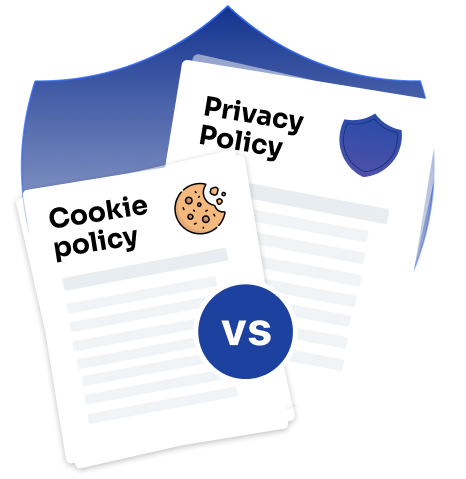Introduction
Data privacy and security are of utmost importance for both users and website owners in today’s digital landscape. Two fundamental legal documents that directly tackle these concerns are the privacy and cookie policies.
Although these two policies might appear to have some similarities, they each serve distinct purposes and play a critical role in ensuring legal compliance and fostering trust with users.
The privacy policy outlines how a website collects, uses, and protects user data. Τhe cookie policy specifically addresses the use of cookies and similar tracking technologies, including tracking cookies, which pose privacy risks associated with online profiling.
It is crucial to explain how the personal data collected from users will be used to comply with privacy regulation laws such as GDPR and CCPA. Both policies are essential components for website owners to demonstrate their commitment to safeguarding user information and abiding by relevant privacy regulations.
What is a privacy policy?
A privacy policy is a comprehensive legal document that outlines how a website collects, uses, discloses, and protects personal data from its users. This policy is a legal obligation under various data privacy laws, including the General Data Protection Regulation (GDPR) and the California Consumer Privacy Act (CCPA), and it must clearly explain how users’ personal data will be used to comply with these regulations.
Privacy policies inform users about the types of personal data collected, the purposes of data collection, and their rights concerning their personal data. They are designed to ensure transparency and help users understand how their personal information is handled.
What is a cookie policy?
On the other hand, a cookie policy is a specific document that provides detailed information about using cookies on a website. Tracking cookies plays a significant role in online profiling and poses privacy risks, especially when third-party cookies are involved.
Cookies are small text files stored on a user’s device to collect data about their browsing activities. This policy explains the types of cookies used, their purpose, and how users can manage or disable cookies.
Cookie policies are essential for legal compliance with data protection regulations like the GDPR, which requires explicit consent from users before placing cookies on their devices. They help website visitors understand the data collection practices related to cookies and similar technologies.
Critical differences between privacy policies and cookie policies
While both documents deal with data collection and user privacy, their focus areas differ significantly. A privacy policy covers all aspects of personal data processing, including collection, usage, and protection. It encompasses various data types, such as names, email addresses, and payment information.

In contrast, a cookie policy specifically addresses cookies and similar technologies. It details the types of cookies (e.g., session cookies, analytics cookies, third-party cookies) and their purposes (e.g., tracking user behavior, targeted advertising). This policy also provides instructions on how users can reject cookies or withdraw consent.
| Aspect | Cookie Policy | Privacy Policy |
| Purpose | This section details the types of cookies used (e.g., session, persistent, third-party), their purpose, and their lifespans. | Covers the broad management of personal data by the website, including collection, use, and protection. |
| Content | It often includes information on how users can manage or opt out of cookies. | Includes information on data collection methods, data usage, third-party data sharing, user rights, and data security measures. |
| User Control | It is updated to reflect changes in data management practices or to comply with legal updates. | In many jurisdictions, it is required to inform users specifically about cookie usage. |
| Legal Requirements | This section explains users’ rights regarding their personal data, such as accessing, correcting, or deleting their data. | It is required under various data protection laws (like GDPR and CCPA) to inform users about all aspects of personal data processing. |
| Updates and Changes | Updated as changes are made to the types of cookies used by the website. | Updated to reflect changes in data management practices or to comply with legal updates. |
Legal requirements for privacy policies
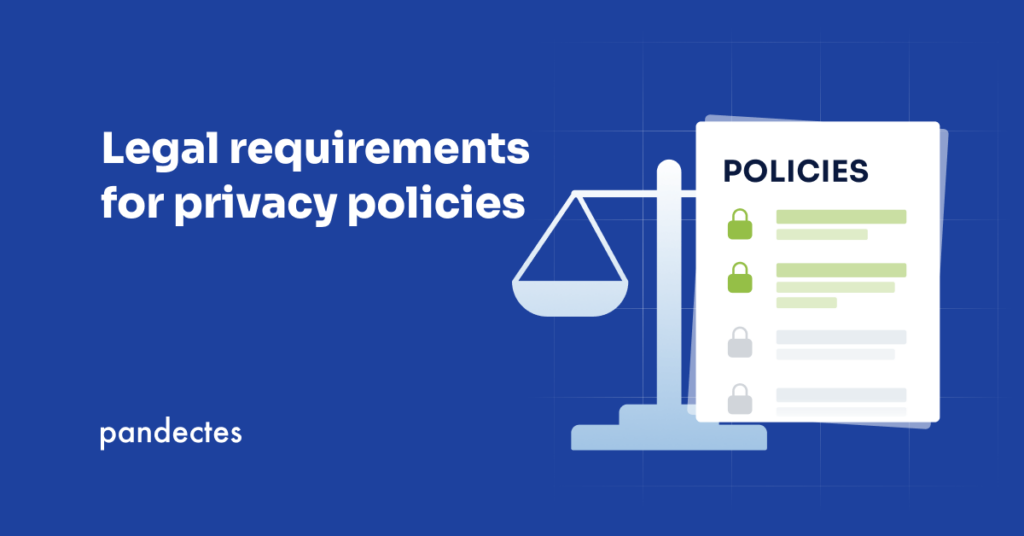
Under the GDPR, a privacy policy must include specific information such as the data controller’s identity, the legal basis for data processing, data retention periods, and the rights of data subjects. The policy must be clear, concise, and easily accessible to users.
Similarly, the CCPA requires businesses to disclose the categories of personal information collected, the purposes for collection, and the rights of California residents, including the right to opt out of the sale of their personal data. Failure to comply with these requirements can result in significant penalties.
Legal requirements for cookie policies
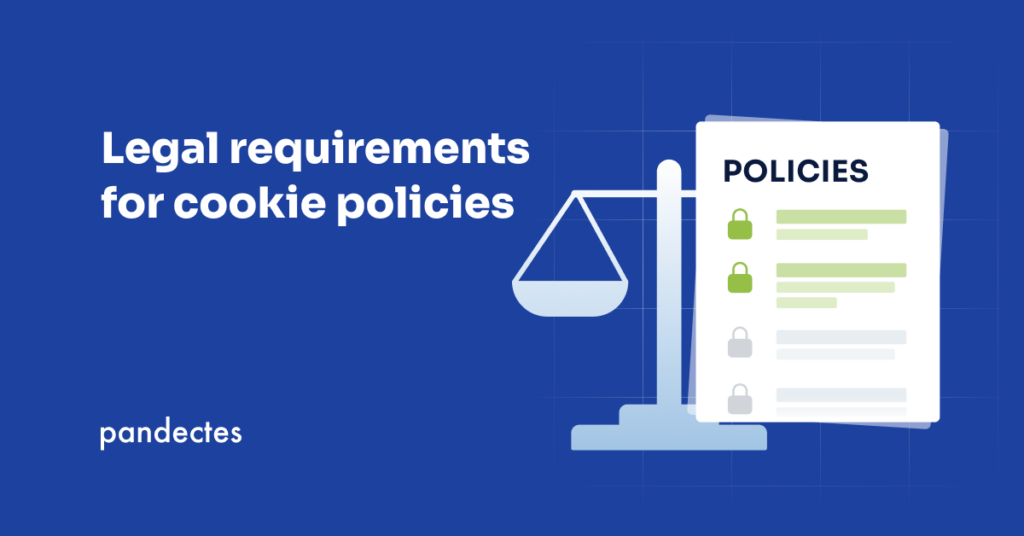
The GDPR mandates that websites obtain explicit consent from users before placing non-essential cookies on their devices. A cookie policy must detail the types of cookies used, their purpose, and how users can manage their cookie preferences.
Additionally, the policy must be easily accessible and written in clear, understandable language. Website owners must allow users to accept or reject cookies through a cookie banner or similar mechanism.
The role of third-party cookies

Third-party cookies are set by domains other than the one the user is visiting. They are commonly used to track user behavior across different websites for targeted advertising. Both privacy policies and cookie policies must address the use of third-party cookies and inform users about the associated data collection practices.
Third-party cookies can raise significant privacy concerns by allowing advertisers and other third parties to collect extensive data about users’ online activities. Proper disclosure and user consent are critical for compliance with data privacy laws.
Data collection and user consent

Privacy and cookie policies emphasize the importance of user consent for data collection. Under the GDPR, user consent must be freely given, specific, informed, and unambiguous. Users must be able to withdraw consent at any time.
Cookie policies typically involve obtaining explicit consent through a cookie banner that informs users about the types of cookies used and their purposes. Users should be able to accept or reject cookies, and the website should respect their preferences.
Informing users about data collection
Transparency is a key principle in data protection laws. Privacy policies must inform users about the types of data collected, the purposes for data processing, and the entities with whom the data is shared. This includes customer data, personal information, and sensitive personal information.
Cookie policies, while more specific, also serve to inform users about cookie data collection practices. They explain how cookies collect data such as browsing history, online activity, and user preferences and how this data is used to enhance website functionality and user experience.
Data protection and security measures

Both privacy policies and cookie policies must address data protection and security measures. Privacy policies should outline the technical and organizational measures to protect personal data from unauthorized access, disclosure, or destruction.
Cookie policies should also explain how cookies and similar technologies ensure data security. This includes using secure protocols and encryption to protect data collected through cookies.
User rights under data privacy laws
Data privacy laws like the GDPR and CCPA grant users various rights regarding their data. Privacy policies must detail these rights, including the right to access, rectify, erase, and restrict the processing of personal data. Users also have the right to data portability and object-to-data processing.
Cookie policies should inform users about their rights to manage cookie preferences, reject cookies, and withdraw consent at any time. These policies should provide clear instructions on how users can exercise their rights.
The importance of clear and accessible policies
Clarity and accessibility are paramount for both privacy policies and cookie policies. These documents should be written in plain language, avoiding legal jargon that could confuse users. They should also be easily accessible from all website pages, typically through a footer link.
Providing clear and accessible policies helps build user trust and demonstrates a website’s commitment to data privacy and security. It also ensures compliance with legal requirements and reduces the risk of legal penalties.
Cookie banners and user preferences
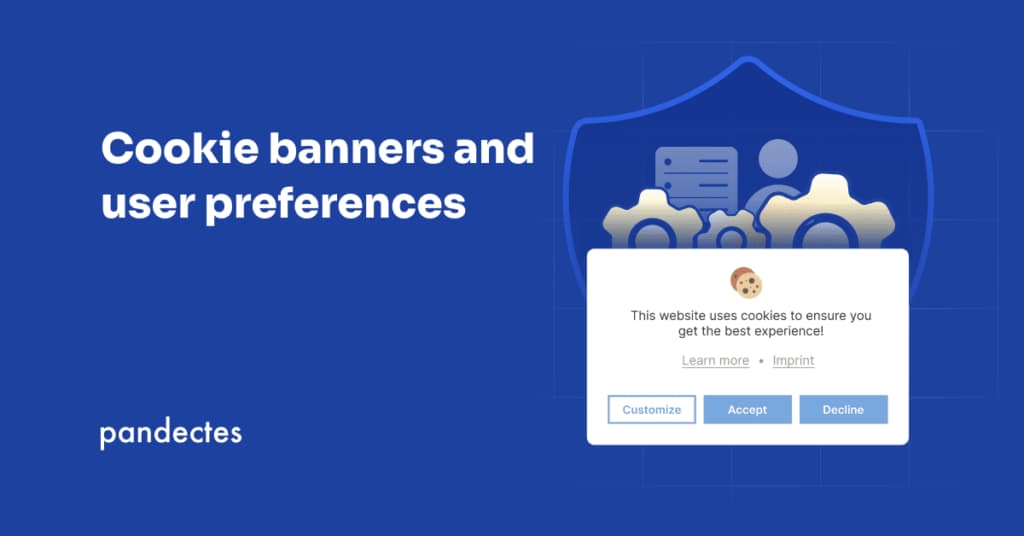
Cookie banners are a standard mechanism for obtaining user consent for cookie usage. These banners inform users about the types of cookies used and provide options to accept or reject cookies. Users should also be able to manage their cookie preferences through a settings page.
Cookie policies should detail the functionality of cookie banners and explain how users can customize their cookie settings. This transparency ensures that users have control over their data and enhances their browsing experience.
Data retention and expiration dates
Both privacy policies and cookie policies should address data retention periods. Privacy policies must specify how long personal data is retained and the criteria used to determine retention periods. This ensures compliance with data protection principles and legal requirements.
Cookie policies should provide information about cookie expiration dates. Users need to know how long cookies will remain on their devices and how they can delete or manage them. This helps users make informed decisions about their data.
Handling sensitive personal information
Sensitive personal information, such as health, financial, and location data, requires special handling and protection. Privacy policies must outline the measures to protect sensitive data and ensure its confidentiality and security.
Cookie policies should also address handling sensitive data collected through cookies and similar technologies. This includes ensuring that any data collected is used in compliance with data privacy laws and that users are informed about the types of data collected.
The role of web beacons and similar technologies
Web beacons, or pixel tags, are used with cookies to track user behavior and gather data about website interactions. Privacy policies should include information about the use of web beacons and how they contribute to data collection and processing.
Cookie policies should explain the role of web beacons and similar technologies in tracking user activity and enhancing website functionality. Users should be informed about how these technologies work and how they can manage or disable them if desired.
Ensuring user trust and transparency
Building user trust is essential for any online service. Privacy and cookie policies are crucial in establishing transparency and demonstrating a commitment to data privacy and security. Clear, comprehensive policies help users understand how their data is handled and what measures are in place to protect their privacy.
Transparency in data collection practices, user rights, and data protection measures fosters trust and confidence among users. This trust is vital for maintaining a positive relationship with website visitors and ensuring their continued engagement.
Cookie Policy and GDPR compliance on Shopify
A cookie policy is crucial for any website, particularly e-commerce platforms like Shopify. It informs users about the types of cookies, the purpose behind their use, and how users can manage their cookie preferences. This policy ensures transparency and compliance with data privacy laws such as the General Data Protection Regulation (GDPR) and the California Consumer Privacy Act (CCPA).
Shopify, a leading e-commerce platform, allows store owners to easily create and manage online stores. However, with the diverse global customer base that Shopify merchants cater to, compliance with various international data privacy laws is essential. This is where the Pandectes GDPR Compliance app for Shopify becomes invaluable.
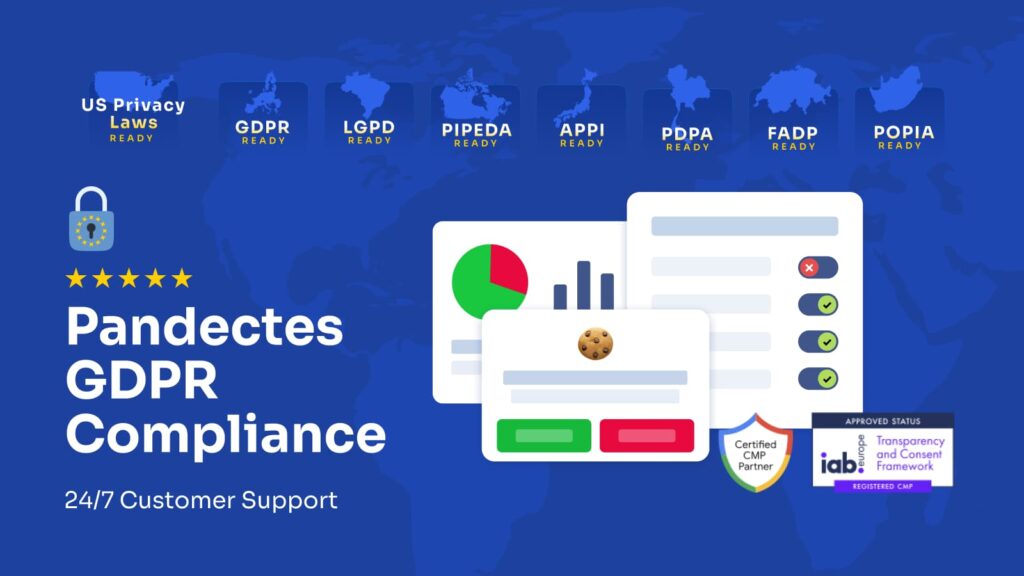
Pandectes is a Google Certified CMP & IAB/TCF v2.2 Certified CMP for Google Consent Mode v2 as well as Microsoft Consent Mode. The Pandectes GDPR Compliance app is designed to help Shopify merchants manage cookie consent and script blocking seamlessly. It ensures that all cookie consents are obtained and recorded in compliance with GDPR, CCPA, and other data protection regulations. The app provides features like a customizable cookie banner that informs users about cookie usage and allows them to accept or reject cookies based on their preferences.
With Pandectes, Shopify store owners can manage cookie consents and related scripts from a single interface. This reduces the risk of legal challenges and builds trust with users by demonstrating a commitment to data privacy and security. The app supports integrations with various third-party platforms, ensuring comprehensive compliance across marketing and tracking tools.
The Pandectes GDPR Compliance app is an essential tool for Shopify merchants to maintain legal compliance and ensure their cookie policies are effectively communicated and managed, fostering transparency and user trust.
Conclusion
Understanding the differences between privacy and cookie policies is essential for website owners and users. While both documents address data collection and user privacy, they serve distinct purposes and are governed by different legal requirements.
Privacy policies provide a broad overview of how personal data is handled, while cookie policies focus specifically on cookies and similar technologies. Ensuring compliance with data privacy laws and maintaining clear, accessible policies helps build user trust and protect personal information.
By effectively understanding and implementing these policies, website owners can demonstrate their commitment to data privacy and security, enhance user experience, and foster a positive online environment.

